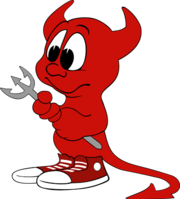Hi, all.
To answer the original post first, I believe that you aren’t quite creating an original character from a “canon” character with a gender change, a change in “satisfaction” with the character’s birth gender, a change in the character’s sexual orientation, or a change in the character’s “sex drive” for lack of a better way to phrase it. But, you are coming very close.
Unless you’re writing your fanfiction work entirely within the canon confines of a “serial” original work, you are of necessity writing an alternate universe. So, there will be “changes” rolling about. But some changes are far more significant, or potentially jarring than others. So, as an author you need to alert the reader somehow that you’re making very major changes to the status quo from the very beginning, and that they might not necessarily like the changes that you’ve made.
Whether real human beings or fictional characters, we are far more than the sum of our gender, gender satisfaction, conventionality of expressing those, or the degree to which we seek to “perform” sexually. However, all of those do shape us noticably as people, absent serious conscious effort to go contrary to our “natural” tendencies. Thus, while you can portray Group Captain Jack Harkness as a genuine and absolute vow-following Catholic Priest, or Father Brown as an open and notorious cross-dressing sexual libertine, both characterizations would be far out-of-character when compared to their “original” counterparts, even if they would be “close enough” to get you sued by their “owners” if you tried to write about them for profit. Even giving Father Brown a first name would be “Alternate Universe,” since G. K. Chesterton avoided ever giving his most profitable character a first name. So, a story with either character would desperately need “content flags,” or whatever other means your publishing site(s) allow to not upset potential readers. Some readers won’t like you out-of-character protagonists. Others will adore them, and will read everything you write about them, provided that it is written well.
Everyone else here has also made wonderful points. Whether you’re placing an actual character behind what was in canon “just a name,” or whether you are changing a “near-core” trait of a major character, or even an actual core trait, you are having to (re)create that character, and sometimes out of whole cloth. So long as you inform the reader up-front that you’re doing so, no harm is done. And, if you do it well, then your readers will be pleased and entertained. Even turning up a character’s sex drive to eleven or down to three-quarters is a noticeable change.
Fleshing out “just a name” characters can be more satisfying to the reader than completely inventing a new character. But this still depends on fleshing out the character well. Taking “mid-background” characters and fleshing them out without changing their (limited) appearance from canon can be even better. And sometimes, the original content creator just wrote a character whose existence in canon is bat-shit insane; and “retconning” that character is actually a benefit to the reader. An example of this that comes to mind is the “Fat Friar” from the Rowlingverse.
As far as that goes, if you weren’t changing anything in your story, then it wouldn’t be fanfiction – it would be plagiarism. So, “laissez le bon temps rouler” and write away, changes and all. If you make Petunia and Vernon Dursley so totally accepting of Harry Potter that Petunia magically receives and gives birth to Harry’s full-blooded younger sibling and five or six additional children with Vernon, and the blood wards make the entire Little Whinging housing estate extraordinarily fecund, then go ahead. There is exactly such a story on “St. Elsewhere,” and it’s actually very good.
As a reader, I don’t like to be “surprised” by unexplained or “unadvertised” changes. If I know about the “changes” going in, I might read (and possibly enjoy) the story anyway, or I might avoid it without feeling resentful, “cheated” or misled. Of course, even being “advertised” up front, the changes still have to make some kind of sense, both in canon and in life itself. So, odds are that I’m not going to read your gender-changed gender dysphoric full-Subcontinental Indian Harry Potter who grew up in rural South Carolina as an accordion and banjo prodigy who started Hogwarts at the age of sixteen, no matter how well you’ve written it. But, there are plenty of readers who will read it if you’re up-front and honest about your changes.
As a writer, I try to make every effort to “warn” the reader if there are major changes to “canon” characters beforehand. Even so, some readers are only marginally capable of reading, period; and on some occasions will leave reviews telling you just that. Those readers will never be satisfied, no matter how well you’ve written your story. However, I can in good conscience ignore those readers, since if they were actually capable of reading, they were warned.
Cheers!






